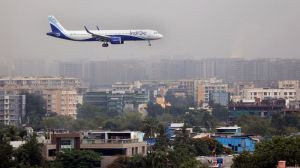Stay updated with the latest - Click here to follow us on Instagram
Fashion Street wears green,buys paper and cloth bags
South Mumbais popular Fashion Street has become a plastic-free zone thanks to the efforts of BMC engineer Subhash Dalvi over the past two years.
South Mumbais popular Fashion Street has become a plastic-free zone thanks to the efforts of BMC engineer Subhash Dalvi over the past two years. Moved by Dalvis perseverance,the 385-odd traders here have switched to paper and cloth bags. Moreover,the paper bags used in Fashion Street are purchased from the training workshop of the National Association of the Blind,thus generating employment for the visually impaired.
Working as an engineer in the survey section of the building proposals department and as an officer on special duty in the solid waste management department of the BMC,Dalvi saw a large number of plastic bags being used at the bustling roadside market near Cross Maidan. I realised that if I can get all 385 shopkeepers to stop using plastic bags it will make a significant contribution to the environment. Plastic bags are not biodegradable and pose a great environmental threat, said Dalvi.
Dalvi invited four members of the Fashion Street Shopowners Association to come over to his office in Byculla where he showed them a presentation on the ill-effects of using plastic. Mohammed Sohail Sheikh,one of traders who saw the presentation,said they were inspired by the presentation and in turn convinced other shopkeepers to shun plastic. Initially,some shopkeepers were reluctant to switch over as paper and cloth bags are costlier. But some BMC officials too came over to the market to convince the rest of us. Since December we have been using paper and cloth bags, said Sheikh.
The paper bags are being made by visually challenged people at the NABs Job and Training Centre in Reay Road. Ashok Parihar,production officer at centre,said visually challenged people without any qualifications get a good chance to earn money through such projects. They first placed an order of 15,000 bags and have now asked for another 20,000 bags. It is generating good income for these people, said Parihar.
But going green comes at a price for the traders. While the plastic bags used to cost Re 1,the small paper bags cost Rs 2.50 per piece and the big one costs Rs 3. The cloth bags,on the other hand,cost Rs 5.
We do not charge the customer for the bag. If the customer buys one or two garments we give the smaller paper bag,and the bigger paper bag for up to four garments. If five products or more are bought we give him the cloth bag, said shopkeeper Shashidhar Sanel.







